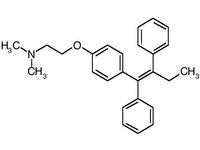Zeneca will begin a direct-to-consumer advertising campaign for its breast cancer drug, Nolvadex (tamoxifen citrate), on television and in magazines starting early in 1999, and has started preparing physicians and pharmacists with educational materials and information on the drug, which was approved for the reduction of breast cancer in women at high risk for developing the disease. The Food and Drug Administration avoided the word prevention.
Zeneca officials have said their own market research tells them that women are likely to be cautious. The company targets the potential market for the drug at about 10 million women who are at high risk for developing the disease. Approximately 400,000 women already take tamoxifen because they have had breast cancer and are seeking to reduce the chance of a recurrence.
The largest breast cancer study to date, involving 22,000 women, will begin in early 1999. The NCI-funded study will compare Nolvadex with Lilly's osteoporosis drug, raloxifene (Evista) for reducing the incidence of breast cancer. Researchers are conducting the trial to see if the Lilly drug has fewer side effects than tamoxifen, which has been linked to increased risk of endometrial cancer.
COPYRIGHT 1998 Lebhar-Friedman, Inc.
COPYRIGHT 2000 Gale Group



